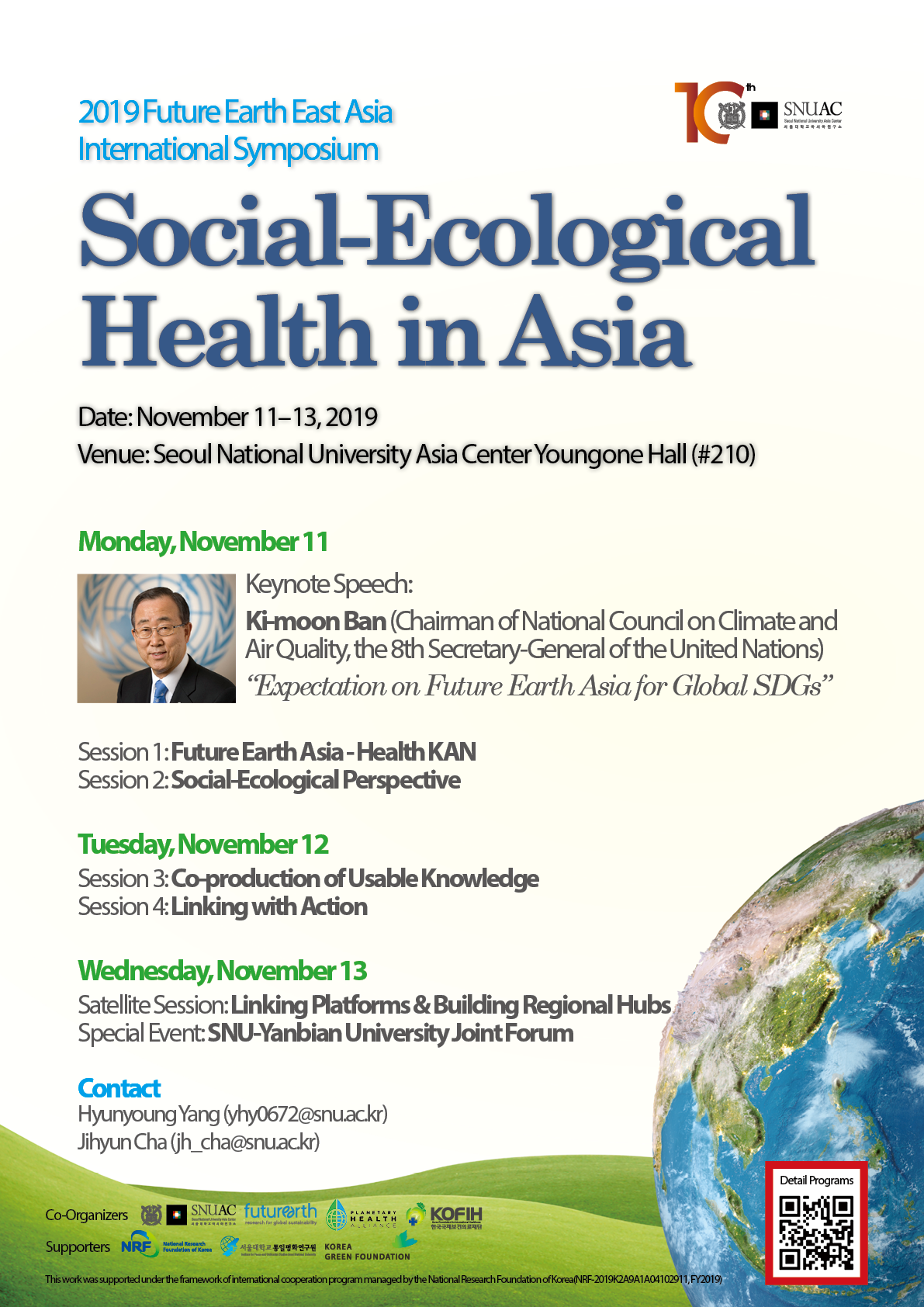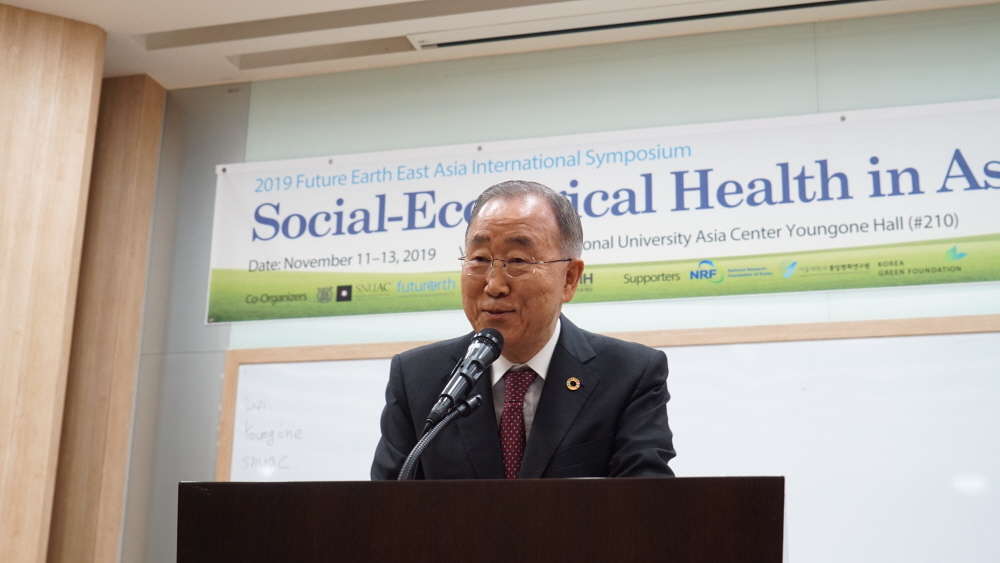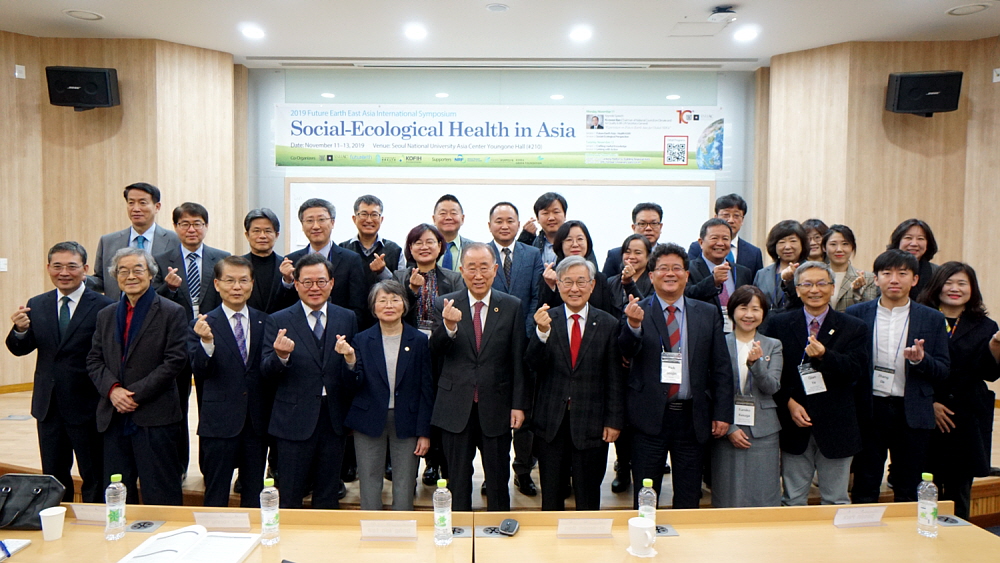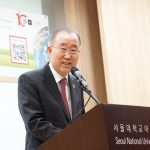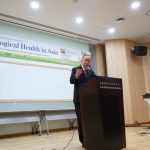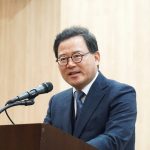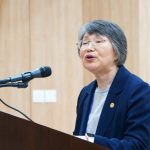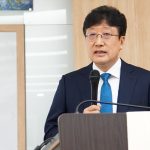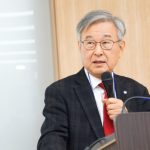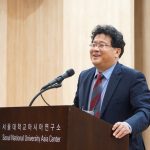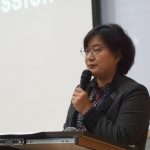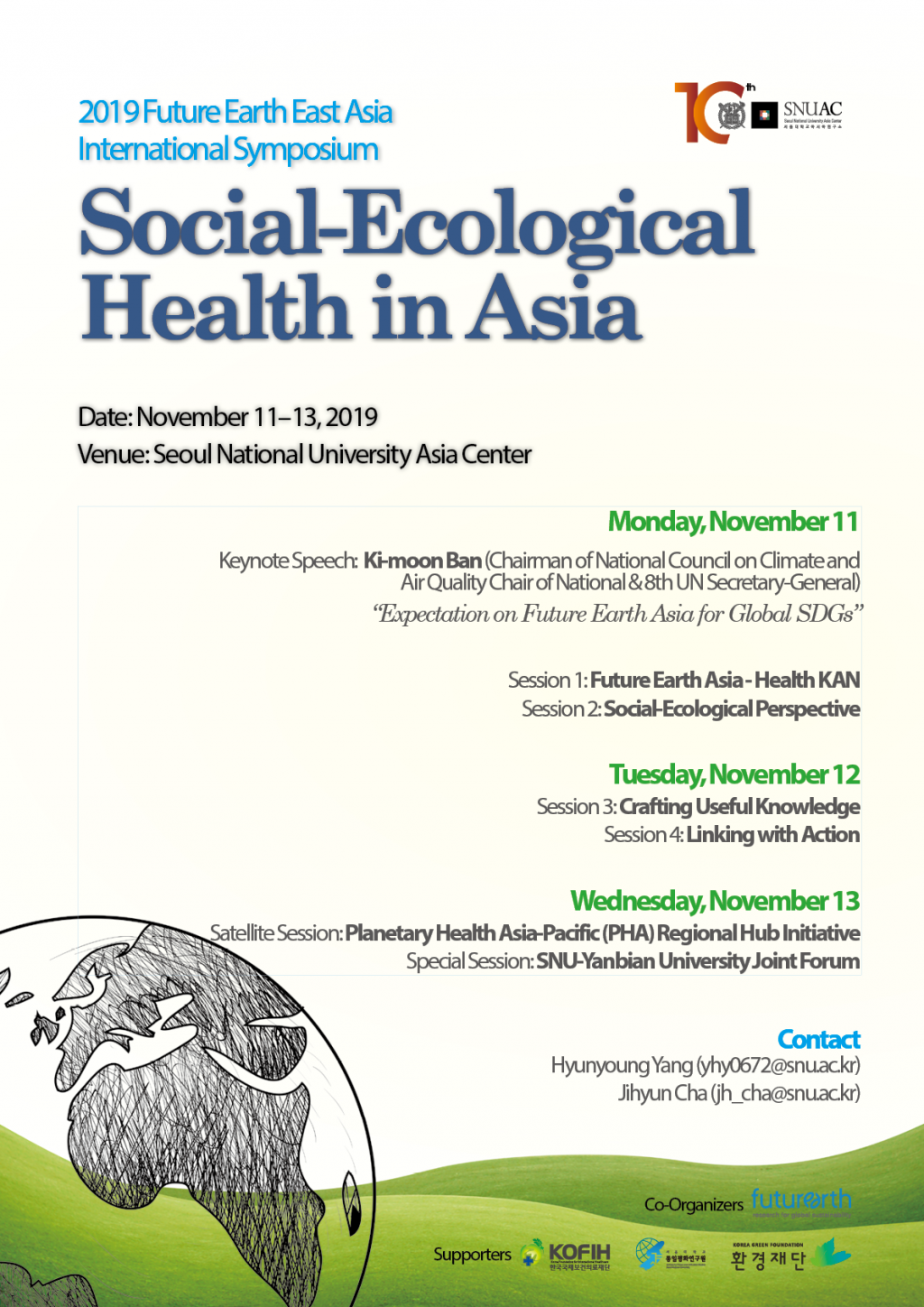
Social-Ecological Health in Asia
- Date: November 11-13, Monday-Wednesday, 2019
- Place: Room 303, SNUAC (Bldg.101)
2019 Future Earth East Asia International Symposium
Social-Ecological Health in Asia
November 11–13, 2019 | Seoul, Republic of Korea
Venue: Seoul National University Asia Center (SNUAC)
In Asia, radical changes to the function & structure of social-ecological systems (SES) represent a growing threat to health of human civilization and the natural ecosystems which it depends on. An increasing interdependence of human health, ecosystem integrity, and the consequences are highly complex in terms of scale, urgency, equity, justice and policy. Therefore, we need a transdisciplinary platform that will bring in diverse fields, and deliver scientific paradigms, policy frameworks, communication strategies, and sustainability imperatives.
Platforms such as Future Earth Health Knowledge-Action Network (KAN), Planetary Health, GeoHealth are based on the understanding that human health & civilization depend on flourishing natural ecosystems and the wise stewardship of SES. They require the generation of not just more knowledge but more usable knowledge, implementation of wise policies, decisive action with visioneering. Triple challenges have been identified to maintain and enhance social-ecological health (The Lancet Planetary Health, 2017): 1) imagination challenge (conceptual & empathy failures), 2) research & information challenge (knowledge failures), and 3) governance challenge (implementation failures). Usable knowledge-production and linking with action in SES are continually morphing each other, and what should we, researchers and practitioners, know and do about?
The symposium will bring together diverse delegate from local, national, and regional platforms particularly in Asia. Following list covers some of the topics to be presented during the Symposium. Other subjects related to the triple challenges regarding social-ecological health are also welcome.
- Health of human and nature in Asia
- Social-ecological perspectives
- Surprises and inadvertent consequences
- Co-production of usable knowledge
- Linking knowledge with action
- Stakeholder collaboration and social learning
- Knowledge governance and visioneering
| ㆍ | Chairman | : | Soonchang Yoon (yoon@snu.ac.kr)Chair, Future Earth Korea National Committee |
| ㆍ | Main Organizers | : | Joon Kim (joon@snu.ac.kr)Director, Future Earth Program, SNUAC
SooJin Park (catena@snu.ac.kr) Director, SNU Asia Center |
| ㆍ | Secretariat | : | Eunhui Eom (likemoon@snu.ac.kr)Research Fellow, SNUAC |
| ㆍ | Staff | Hyunyoung Yang (yhy0672@snu.ac.kr)Jihyun Cha (jh_cha@snu.ac.kr) |
Seoul National University Asia Center’s Future Earth Program held <2019 Future Earth East Asia International Symposium> over three days from November 11th to 13th, 2019.
As the second event following last year’s first Future Earth East Asia International Symposium, this year’s event was joined by about 210 experts representing major countries in Northeast Asia and Southeast Asia from 15 countries including Japan, China, Mongol, Philippines, Indonesia and India, eminent domestic and foreign scholars, members of the SNU community, agents in international cooperative development, and citizens interested in Future Earth. The participants joined the presentations and discussions in a serious yet passionate manner for three days under the theme of “Social-Ecological Health in Asia”. The symposium provided an opportunity for all to think about the ecological health of the earth and human health/public health in integration.
Especially in this symposium, Ki-moon Ban, the current chairman of National Council on Climate and Air Quality Chair of National and the 8th UN Secretary-General, gave a speech emphasizing the role of Future Earth and innovation of scientific technology in achieving the SDGs for a sustainable future and the importance of global partnership and Korean society based on his experience at UN. Also, Kong-Joo Lee, Advisor to the President for Science and Technology, visited the event to explain not only the innovations in science and technology for responding to global crises including climate change, but also governmental efforts to inclusive development.
This symposium was joined by not only the members of SNUAC but also various members of the SNU community including those from College of Social Sciences, College of Agriculture and Life Sciences, College of Education, Graduate School of Environmental Sciences, and Graduate School of Public Health, and it was notable for its transdisciplinary cooperation that aimed to derive the direction of executable policy research and future common tasks for enhancing the sustainability of East Asia and the Korean peninsula.
As the structure and function of the social-ecological system are changing rapidly in Asia, they are looming as great threats to the natural ecosystem that humans rely on. There are increasing needs for creating transdisciplinary research and knowledge to understand the social-ecological system which is a mutual dependence of humanity and nature, thus a complex system, and Future Earth is being utilized as a platform of research and practice seeking sustainable measures responding to the global climate, environmental, and socioeconomic crises.
Prof. Joon Kim, the main organizer of this symposium, emphasized that “in the future, we need a transdisciplinary platform that includes diverse disciplines and addresses scientific paradigms, policy frameworks, communication strategies, and sustainability imperatives”, and announced that “Seoul National University Asia Center is set to act as a regional hub of Future Earth in the Asia Pacific and a transdisciplinary platform.”
This symposium was jointly held by SNUAC, Future Earth Korea, and Korea Foundation for International Healthcare, sponsored by the National Research Foundation of Korea, SNU Institute for Peace and Unification Studies and Korea Green Foundation.

